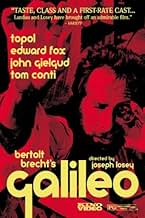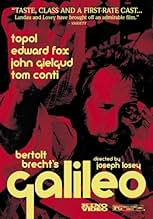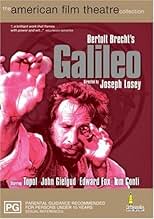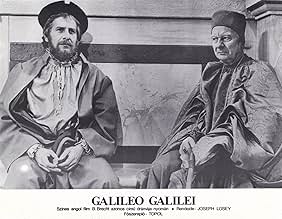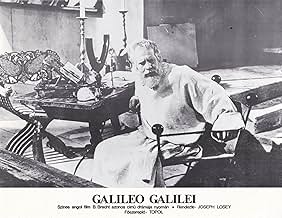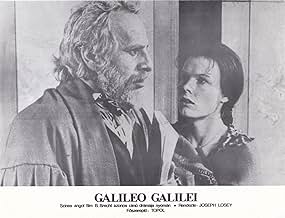Galileo Galilei, his telescopic discoveries, support of Copernican theory, conflict with Catholic Church leading to imprisonment, and influence on future scientists like Newton and Kepler.Galileo Galilei, his telescopic discoveries, support of Copernican theory, conflict with Catholic Church leading to imprisonment, and influence on future scientists like Newton and Kepler.Galileo Galilei, his telescopic discoveries, support of Copernican theory, conflict with Catholic Church leading to imprisonment, and influence on future scientists like Newton and Kepler.
6.5797
1
2
3
4
5
6
7
8
9
10
Featured reviews
A bland film
See the Plot Summary to know what this film is about.
Topol with his impatient manner of speech is somewhat insufferable as Galileo. But then, by all accounts, the real Galileo had a touch of arrogance in him and was not very likeable. This movie does not capture the horrors of pre-Industrial Europe, when religious authorities could inflict the most fiendish tortures on any victims they chose. This movie could have made a statement about religion run amok in the social milieu of the day. Instead, it is a bland film lacking dramatic tension. It is a movie adapted from a play and it shows. There is even a chorus of choirboys which is totally out of place. However, there are few bio-pics of great scientists, so this one is worth watching once.
Topol with his impatient manner of speech is somewhat insufferable as Galileo. But then, by all accounts, the real Galileo had a touch of arrogance in him and was not very likeable. This movie does not capture the horrors of pre-Industrial Europe, when religious authorities could inflict the most fiendish tortures on any victims they chose. This movie could have made a statement about religion run amok in the social milieu of the day. Instead, it is a bland film lacking dramatic tension. It is a movie adapted from a play and it shows. There is even a chorus of choirboys which is totally out of place. However, there are few bio-pics of great scientists, so this one is worth watching once.
Owing a huge debt to Galileo
Have for a long time had a lot of respect for Bertolt Brecht and 'Life of Galileo' is one of his most interesting works, especially from a thematic standpoint. Galileo, his life and observations (ahead of the time in his day) were fascinating and he is still deserving of being a giant influential figure in science and modern physics. Joseph Losey did some very good films, including his work with Harold Pinter and his 'Don Giovanni'. The cast sounded perfect on paper.
They weren't completely on film though, due to the actor who sounded like the perfect choice for their role strangely not working. 'Galileo' is well worth watching and is one despite some big drawbacks one of the better films of the inconsistent American Film Theatre series. As well as one of the more interesting entries, again from a thematic and content standpoint. It is no masterpiece, but there are a lot of good things here in 'Galileo' executed greatly. If one doesn't know of Galileo or know a lot about him, this film has enough to make them intrigued more.
'Galileo' is made with an appealing visual style, with grander sets than the usual ones for the American Film Theatre films and the photography is expansive enough without being overblown. Visually and dramatically, of all the play to film adaptations of the series 'Galileo' is one of the least stagebound. Losey directs with restraint but with confidence, he seemed an odd choice for director on paper as this is different territory for him but he does very well. The script is intelligent without being wordy.
A script too that expertly shows what made Galileo so fascinating, what made his findings so important in the development of science and the challenges he had to face. The story is intelligently done and gutsy on the whole and as said it makes one want to know more about the man. The themes of the play are handled well with some genuine tension in the conflict, and actually it was not so bad a thing that the political elements weren't largely emphasised (they're far from absent though) in my view. The Pope and Inquisitor scene is hair raising. 'Galileo' does stray from the facts, but through no fault of the film as Brecht never intended the play to be a biopic. The cast on the whole are very good, with some expertly controlled and authoritative acting.
With one big exception, as much as it pains me to say it. Can understand completely the criticisms for Topol's Galileo and do agree. Will say right now that there have been criticised performances in film history that to me are nowhere near as bad as cited. There was another performance in the American Film Theatre series that got a good deal of criticism, Lee Marvin in 'The Iceman Cometh'. Actually found him very admirable in his role, and he was against type whereas Galileo sounded tailor made for Topol. Who has the physique but sadly neither the heft or the subtlety, he brought those in 'Fiddler on the Roof' so what happened.
It doesn't help though that the film also misses the point of the character in the play, he is written and portrayed as too sympathetic (or that's how it came across, and this was the case more than once in the play's performance history) whereas Brecht intended for him to be a condemnation. Furthermore, while understanding what their role in the film was meant to be, kind of a Greek chorus explaining events and motivations, the choir did feel out of place and interrupted the action rather than moved it on. A few scenes went on for too long and felt like padding.
Summing up, a few big problems but a lot of strengths. Pretty good and in the better half of the series. 7/10.
They weren't completely on film though, due to the actor who sounded like the perfect choice for their role strangely not working. 'Galileo' is well worth watching and is one despite some big drawbacks one of the better films of the inconsistent American Film Theatre series. As well as one of the more interesting entries, again from a thematic and content standpoint. It is no masterpiece, but there are a lot of good things here in 'Galileo' executed greatly. If one doesn't know of Galileo or know a lot about him, this film has enough to make them intrigued more.
'Galileo' is made with an appealing visual style, with grander sets than the usual ones for the American Film Theatre films and the photography is expansive enough without being overblown. Visually and dramatically, of all the play to film adaptations of the series 'Galileo' is one of the least stagebound. Losey directs with restraint but with confidence, he seemed an odd choice for director on paper as this is different territory for him but he does very well. The script is intelligent without being wordy.
A script too that expertly shows what made Galileo so fascinating, what made his findings so important in the development of science and the challenges he had to face. The story is intelligently done and gutsy on the whole and as said it makes one want to know more about the man. The themes of the play are handled well with some genuine tension in the conflict, and actually it was not so bad a thing that the political elements weren't largely emphasised (they're far from absent though) in my view. The Pope and Inquisitor scene is hair raising. 'Galileo' does stray from the facts, but through no fault of the film as Brecht never intended the play to be a biopic. The cast on the whole are very good, with some expertly controlled and authoritative acting.
With one big exception, as much as it pains me to say it. Can understand completely the criticisms for Topol's Galileo and do agree. Will say right now that there have been criticised performances in film history that to me are nowhere near as bad as cited. There was another performance in the American Film Theatre series that got a good deal of criticism, Lee Marvin in 'The Iceman Cometh'. Actually found him very admirable in his role, and he was against type whereas Galileo sounded tailor made for Topol. Who has the physique but sadly neither the heft or the subtlety, he brought those in 'Fiddler on the Roof' so what happened.
It doesn't help though that the film also misses the point of the character in the play, he is written and portrayed as too sympathetic (or that's how it came across, and this was the case more than once in the play's performance history) whereas Brecht intended for him to be a condemnation. Furthermore, while understanding what their role in the film was meant to be, kind of a Greek chorus explaining events and motivations, the choir did feel out of place and interrupted the action rather than moved it on. A few scenes went on for too long and felt like padding.
Summing up, a few big problems but a lot of strengths. Pretty good and in the better half of the series. 7/10.
10pholmer
"Galileo" is about the scientist's responsibility to society
The movie of Bertolt Brecht's play "Galileo" was made in 1975, starring Topol, with John Gielgud and Clive Revill among others. The goal in making this movie (and all AFT films) was to take a theatrical experience and turn it into a cinematic experience without changing the content to do so. Criticisms that this film didn't do enough to expose the excesses of the Inquisition or that Topol's depiction of Galileo was too abrasive miss the point. This play is about the role and responsibility of the scientist in society. Written during the time that atomic bombs were being created, it criticizes scientists who fail to bring the truth to the people because they fear the retaliation of the authorities.
Galileo is portrayed as an opportunistic genius who is not above stealing someone else's invention and claiming it as his own if it will profit him. He is self-indulgent and corrupt, but he is still a scientist. When his theories of the nature of the universe conflict with the Church's, he recognizes that this may upset not only the way people view the sky, but their own own position in the constellation of their society. Galileo hopes to profit from this, to become a new high priest of science. But when threatened with torture by the Inquisition, a threat the Inquisitors know they dare not carry out because of Galileo's popularity, Galileo capitulates out of the fear of physical pain. His work is confiscated by the Church to be locked away from the people, his recantation is published and the incipient revolution he inspired dies away. Galileo is granted a small pension and forbidden to do any real scientific work.
Years later, Galileo is visited by a former assistant who tells him of the chilling effect his recantation had on scientific progress everywhere in Europe, that no one dares to express any dissident viewpoints. Galileo removes a copy of his scientific treatises from a hiding place and gives it to the assistant to smuggle out of the country. Galileo tells him he has spent many years secretly reconstructing his findings, waiting for someone to give them to. The assistant's tone instantly changes and he lauds Galileo for surviving the Inquisition so his work would not be lost. But Galileo refuses to accept these congratulations and condemns his recanting of the truths he had discovered. He says he knows now that he was never truly in danger and that his personal cowardice led to the continuation of oppressions of all kinds in society as well as the corruption of scientific discovery. He wonders what he and others scientists might have accomplished for the good of all if only he had stood up for the truth when he had the chance to do so. As the assistant leaves with the treatises, Galileo cautions him not to tell anyone where he got them. Galileo still fears reprisals from the powers that be and the loss of his minimal comforts. "...Your cheering at some new achievement would be echoed by a universal howl of horror," Galileo tells his former assistant. "I have betrayed my profession. Any man who does what I have done must not be tolerated in the ranks of science." This all supports playwright Brecht's leftist views, of course, but also accurately reflects the ambivalence of many of the A-bomb scientists about their creation.
"Galileo" was made by the American Film Theatre, the brainchild of producer Ely Landau. The AFT films were shown only in selected movie theaters to audiences who paid a subscription fee for a series of 6 plays on film a year. The AFT series ran from 1973 to 1976. These films were not simply filmed stage productions, nor were they "Hollywoodized" to increase viewers. They used the text of the plays as written by their authors. However, they also used cinematic techniques (close-ups, pans, dolly shots, etc.) to focus the audience's attention on important characters' expressions, reactions and interactions with other characters.
Other plays in this series include "The Man in the Glass Booth", for which Maximilian Schell received a Best Actor Academy Award Nomination, Jean Genet's "The Maids" with Susanna York and Glenda Jackson (I think) an
Galileo is portrayed as an opportunistic genius who is not above stealing someone else's invention and claiming it as his own if it will profit him. He is self-indulgent and corrupt, but he is still a scientist. When his theories of the nature of the universe conflict with the Church's, he recognizes that this may upset not only the way people view the sky, but their own own position in the constellation of their society. Galileo hopes to profit from this, to become a new high priest of science. But when threatened with torture by the Inquisition, a threat the Inquisitors know they dare not carry out because of Galileo's popularity, Galileo capitulates out of the fear of physical pain. His work is confiscated by the Church to be locked away from the people, his recantation is published and the incipient revolution he inspired dies away. Galileo is granted a small pension and forbidden to do any real scientific work.
Years later, Galileo is visited by a former assistant who tells him of the chilling effect his recantation had on scientific progress everywhere in Europe, that no one dares to express any dissident viewpoints. Galileo removes a copy of his scientific treatises from a hiding place and gives it to the assistant to smuggle out of the country. Galileo tells him he has spent many years secretly reconstructing his findings, waiting for someone to give them to. The assistant's tone instantly changes and he lauds Galileo for surviving the Inquisition so his work would not be lost. But Galileo refuses to accept these congratulations and condemns his recanting of the truths he had discovered. He says he knows now that he was never truly in danger and that his personal cowardice led to the continuation of oppressions of all kinds in society as well as the corruption of scientific discovery. He wonders what he and others scientists might have accomplished for the good of all if only he had stood up for the truth when he had the chance to do so. As the assistant leaves with the treatises, Galileo cautions him not to tell anyone where he got them. Galileo still fears reprisals from the powers that be and the loss of his minimal comforts. "...Your cheering at some new achievement would be echoed by a universal howl of horror," Galileo tells his former assistant. "I have betrayed my profession. Any man who does what I have done must not be tolerated in the ranks of science." This all supports playwright Brecht's leftist views, of course, but also accurately reflects the ambivalence of many of the A-bomb scientists about their creation.
"Galileo" was made by the American Film Theatre, the brainchild of producer Ely Landau. The AFT films were shown only in selected movie theaters to audiences who paid a subscription fee for a series of 6 plays on film a year. The AFT series ran from 1973 to 1976. These films were not simply filmed stage productions, nor were they "Hollywoodized" to increase viewers. They used the text of the plays as written by their authors. However, they also used cinematic techniques (close-ups, pans, dolly shots, etc.) to focus the audience's attention on important characters' expressions, reactions and interactions with other characters.
Other plays in this series include "The Man in the Glass Booth", for which Maximilian Schell received a Best Actor Academy Award Nomination, Jean Genet's "The Maids" with Susanna York and Glenda Jackson (I think) an
Galileo
Joseph Losey's adaptation of Bertold Brecht's controversial play about the famous philosopher and scientist. The story focusses on Galileo's run in with the Catholic Church, who whilst largely accepting his scientific evidence on a number of issues, particularly that the Earth was not a stationary object at the centre of the universe, were not prepared for it to be accepted truth. They simply could not allow this scientific fact to interfere in the order of things, particularly in their view the undermining of god and the church first and foremost.
An exception cast has been pulled together to tell the story and it is an absorbing tale, essentially delivered as a play with no exterior shots to be seen. The cast are universally good, although, I was never entirely convinced by Topol in the lead.
An exception cast has been pulled together to tell the story and it is an absorbing tale, essentially delivered as a play with no exterior shots to be seen. The cast are universally good, although, I was never entirely convinced by Topol in the lead.
Delayed by HUAC
This fine work by Berthold Brecht and directed by Joseph Losey is brought to us
by about a 20 year delay period. That was because of the House Un-American
Activities Committee and the blacklisting of both.
Brecht kind of, sort of made his case for HUAC as he went back to East Germany where he was acclaimed a cultural icon. Joe Losey took off for Great Britain where he worked for the most part until his death.
You can see why the mossbacks of HUAC thought Galileo by Brecht was highly subversive stuff. Question church authority and by implication the state because religion was established. No more so than in Italy and its many Catholic city/states.
Galileo Galilei scientist/engineer was a popular well respected fellow who got a hold of a spyglass invented by the Dutchman Hans Lippershey and saw the possibilities for it in astronomy. Already a believer in the theory advanced by Copernicus about the sun being a center of the universe. The telescope allowed Galileo to observe and make more findings. If the Earth is the center of things than what are those bodies orbiting Jupiter for instance?
The Roman Catholic now engaged in a counter attack against all that Protestant type heresy took a dim view of this stuff. Galileo got vigorously questioned for these theories.
Israeli actor Topol plays the bluff and hearty Galileo. He's a man used to his creature comforts and not built for martyrdom as is shown in the play.
The fine cast Losey assembles includes Clive Revill and Georgia Brown as cabaret singers, Michael Lonsdale as Pope Urban, and Edward Fox as the Cardinal Inquisitor. John Gielgud has a great cameo as a cardinal who is beside himself with indignation that anyone would question the workings of the universe, their universe.
Galileo's epitaph despite his failure to martyr himself is the best of all. No amount of proclamations from the state or the pulpit will change the way the universe works.
That IS subversive stuff.
Brecht kind of, sort of made his case for HUAC as he went back to East Germany where he was acclaimed a cultural icon. Joe Losey took off for Great Britain where he worked for the most part until his death.
You can see why the mossbacks of HUAC thought Galileo by Brecht was highly subversive stuff. Question church authority and by implication the state because religion was established. No more so than in Italy and its many Catholic city/states.
Galileo Galilei scientist/engineer was a popular well respected fellow who got a hold of a spyglass invented by the Dutchman Hans Lippershey and saw the possibilities for it in astronomy. Already a believer in the theory advanced by Copernicus about the sun being a center of the universe. The telescope allowed Galileo to observe and make more findings. If the Earth is the center of things than what are those bodies orbiting Jupiter for instance?
The Roman Catholic now engaged in a counter attack against all that Protestant type heresy took a dim view of this stuff. Galileo got vigorously questioned for these theories.
Israeli actor Topol plays the bluff and hearty Galileo. He's a man used to his creature comforts and not built for martyrdom as is shown in the play.
The fine cast Losey assembles includes Clive Revill and Georgia Brown as cabaret singers, Michael Lonsdale as Pope Urban, and Edward Fox as the Cardinal Inquisitor. John Gielgud has a great cameo as a cardinal who is beside himself with indignation that anyone would question the workings of the universe, their universe.
Galileo's epitaph despite his failure to martyr himself is the best of all. No amount of proclamations from the state or the pulpit will change the way the universe works.
That IS subversive stuff.
Did you know
- TriviaJoseph Losey had also directed the original Broadway production of "Galileo," 28 years previously.
- GoofsAfter the crier announces Galileo Galilei's recantation, a chessboard is seen on the left side of the screen: all the pieces are upright. As Galileo enters, a new shot shows that one of the pieces has been toppled. In the next shot, all the pieces are again upright (1:57:50-1:58:10).
- Quotes
Andrea Sarti: [upon Galileo's recantation] Unhappy is the land that has no heroes.
Galileo Galilei: Incorrect. Unhappy is the land that *needs* a hero.
- ConnectionsFeatured in Zomergasten: Episode #23.1 (2010)
- How long is Galileo?Powered by Alexa
Details
- Release date
- Countries of origin
- Language
- Also known as
- Galileo Galilei
- Filming locations
- Production companies
- See more company credits at IMDbPro
- Runtime
- 2h 25m(145 min)
- Sound mix
- Aspect ratio
- 1.85 : 1
Contribute to this page
Suggest an edit or add missing content


